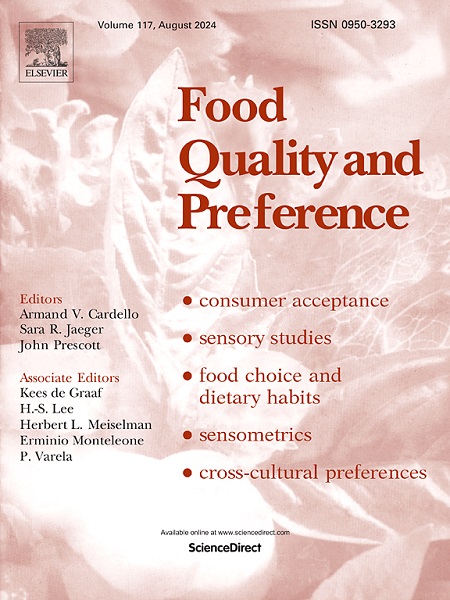From perceived healthiness to acceptance: How influencer type shapes consumer acceptance of insect-based foods
IF 4.9
1区 农林科学
Q1 FOOD SCIENCE & TECHNOLOGY
引用次数: 0
Abstract
Given the rise of influencer marketing in the food sector and the ongoing challenge of promoting consumer acceptance of insect-based foods, this research investigated how influencer type (health-focused vs. indulgence-focused) affects consumer acceptance and identified underlying psychological mechanisms and boundary conditions. Across three experiments, endorsements from health-focused influencers consistently enhanced consumers' perceptions of the healthiness of insect-based foods, which in turn significantly increased their acceptance. In contrast, perceived tastiness did not significantly differ by influencer type and did not mediate the overall effect, although it consistently emerged as a stronger predictor of acceptance than perceived healthiness. Moderated mediation analyses further revealed that the positive indirect effect of health-focused influencers on consumer acceptance via enhanced healthiness perceptions was more pronounced for hedonic (vs. utilitarian) insect-based foods. Moreover, this indirect effect was significant only among individuals with high health consciousness and no prior experience with consuming such products. While the mediating role of perceived tastiness was consistently insignificant, the impact of perceived tastiness on acceptance was significantly weaker among highly health-conscious consumers and stronger among those with prior experience consuming insect-based foods. By contrast, no significant moderating effects were observed for food neophobia or disgust toward entomophagy.
从感知健康到接受:影响者类型如何影响消费者对昆虫食品的接受程度
鉴于影响者营销在食品行业的兴起以及促进消费者接受昆虫食品的持续挑战,本研究调查了影响者类型(以健康为中心vs.以放纵为中心)如何影响消费者的接受程度,并确定了潜在的心理机制和边界条件。在三项实验中,关注健康的影响者的认可不断增强消费者对昆虫食品健康的看法,这反过来又显著提高了他们的接受度。相比之下,感知到的美味并没有因影响者类型而显着差异,也没有调节整体效果,尽管它始终是比感知到的健康更强的接受预测指标。有调节的中介分析进一步揭示,以健康为重点的影响者通过增强健康观念对消费者接受度的积极间接影响,在享乐(与功利)昆虫为基础的食物中更为明显。此外,这种间接影响仅在健康意识高且没有消费此类产品经验的个体中显着。虽然感知味道的中介作用始终不显著,但感知味道对接受度的影响在高度健康意识的消费者中显着较弱,而在先前食用过昆虫类食品的消费者中较强。相比之下,对新食物恐惧症或对食虫的厌恶没有明显的调节作用。
本文章由计算机程序翻译,如有差异,请以英文原文为准。
求助全文
约1分钟内获得全文
求助全文
来源期刊

Food Quality and Preference
工程技术-食品科技
CiteScore
10.40
自引率
15.10%
发文量
263
审稿时长
38 days
期刊介绍:
Food Quality and Preference is a journal devoted to sensory, consumer and behavioural research in food and non-food products. It publishes original research, critical reviews, and short communications in sensory and consumer science, and sensometrics. In addition, the journal publishes special invited issues on important timely topics and from relevant conferences. These are aimed at bridging the gap between research and application, bringing together authors and readers in consumer and market research, sensory science, sensometrics and sensory evaluation, nutrition and food choice, as well as food research, product development and sensory quality assurance. Submissions to Food Quality and Preference are limited to papers that include some form of human measurement; papers that are limited to physical/chemical measures or the routine application of sensory, consumer or econometric analysis will not be considered unless they specifically make a novel scientific contribution in line with the journal''s coverage as outlined below.
 求助内容:
求助内容: 应助结果提醒方式:
应助结果提醒方式:


